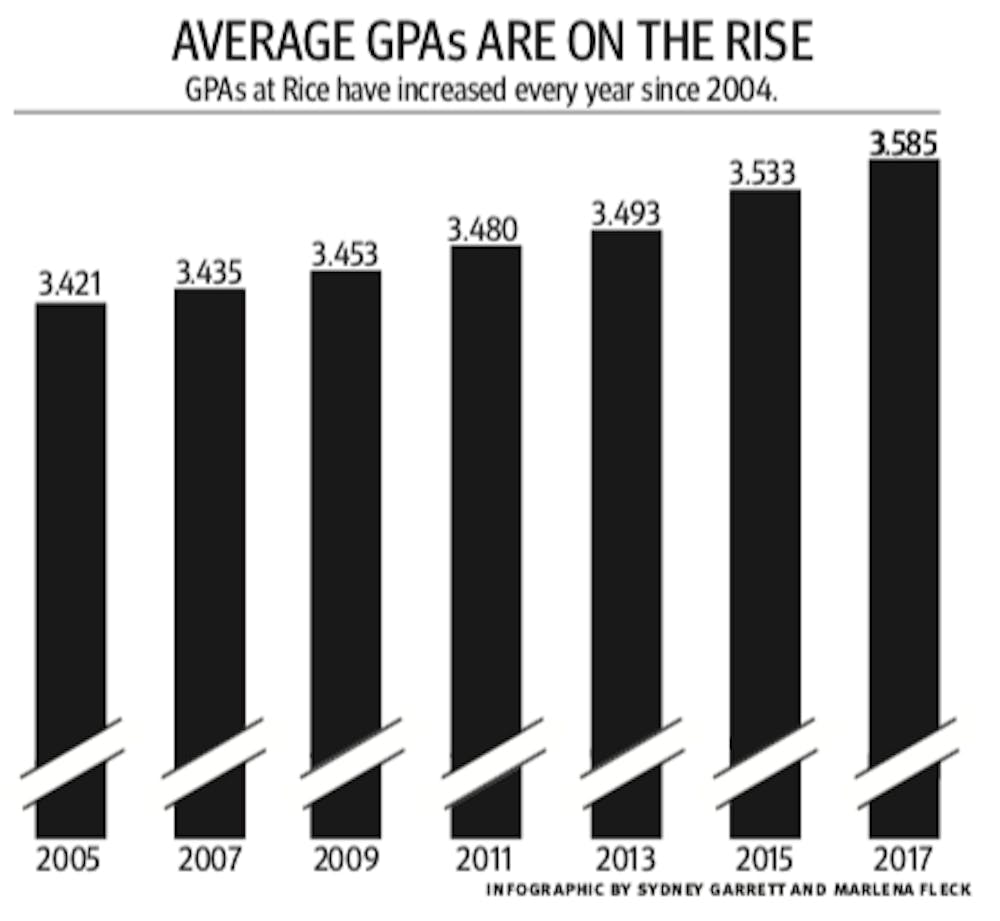A-plus grade point value reduction goes into effect to counter grade inflation

Students earning a course grade of A+ will receive a grade point value of only 4.0 starting this semester, rather than 4.33 as in years past. The change comes after a motion passed by the faculty senate on a 12-9 decision in March 2014 to account for grade inequity and inflation.
Average GPAs have been steadily increasing for over a decade, with the average semester GPA for undergraduates reaching a peak of 3.609 last semester, according to data obtained from the Office of the Registrar.
Between Fall 2004 and Spring 2018, average GPA rose by 0.175, increasing every semester since Fall 2013.
While average GPAs have continued to increase, the variation among undergraduate GPAs has decreased. This trend is indicated by a decrease in the standard deviation of undergraduate GPAs from a peak of 0.612 in Spring 2012 to 0.532 last semester.
The 2014 decision was reached following a grade inflation investigation conducted by a working group created by the 2012-2013 faculty senate. The working group was made up of eight faculty and staff members and one Student Association representative, according to Jane Grande-Allen, one of the co-chairs.
According to Grande-Allen, the decision was primarily motivated by inequity in the assignment of A+ grades and how students reacted to such an imbalance.
“This imbalance had many consequences, such as students choosing majors, courses or professors based on grading trends instead of their own merits,” Grande-Allen said. “And faculty would occasionally be told by students, ‘I need to get an A+ in this course or you will ruin my GPA.’”
Furthermore, the senate was concerned by how A+ grades affected Latin honors at graduation, according to Grande-Allen.
“The A+ imbalance also affected the Latin honors a lot,” Grande-Allen said, “so much so that the faculty senate the previous year had chosen to base selection for Latin honors on GPAs within each school as opposed to all across Rice, as it had been done before that change.”
The working group spent two years compiling and analyzing data on undergraduate GPAs before publishing its final report in March 2014. The report showed a high degree of variation in grading practices across schools, majors and even different sections of the same course, according to Grande-Allen.
“We looked at MATH 101 and PSYC 101 as examples of courses with many sections,” Grande-Allen said. “The variation in percentage of A grades often ranged from [approximately] 20% to 75% from year to year and sometimes within a single year depending on who was teaching the section.”
In its final report, the working group recommended three motions to the faculty senate for approval: mandating faculty-wide discussions within academic programs about grading practices at least every 5 years, reducing the value of an A+ from 4.33 to 4.0 and requiring promotion and tenure abstracts to include additional evidence beyond student ratings, such as teaching observations or syllabi, assignments and exams.
While all three motions were approved in March of 2014, the motion on A+ grades is the last to go into effect. According to faculty senate minutes, the implementation of this change was postponed for four years so that all students who would be affected by the change would be notified about it prior to their arrival at Rice.
The working group’s decision also incorporated other factors, such as the grading procedures of other schools in Rice’s peer group. The report identified five schools including Columbia University and Cornell University that weighed an A+ as over a 4.0, while nine schools including Princeton University, Dartmouth College and Duke University awarded the A+ grade but weighted it as a 4.0. Harvard University, Yale University and Trinity University were among the 14 schools listed as not awarding the A+ grade.
“We looked at practices at peer institutions and this was a common practice,” Evan Siemann, the other co-chair of the working group, said. “There were other potential changes that were brought to the Senate for consideration after consultation with faculty, staff and students and this particular one was well received.”
More from The Rice Thresher

O’Rourke rallies students in Academic Quad
Former U.S. Rep. Beto O’Rourke of El Paso, Texas spoke in front of the Sallyport to a sea of sunglasses and “end gun violence” signs April 17. The rally, organized by Rice Young Democrats, took place in the academic quad from noon to 2 p.m.

Five international visas revoked at Rice
Federal authorities have revoked visas for five international affiliates at Rice — three current students and two recent graduates, President Reginald DesRoches announced in an April 11 message to campus. The revocations are “not related to social activism or protests,” a university spokesperson told the Thresher.

Modified Beer Bike races rescheduled to April 18
Beer Bike races have been rescheduled for April 18 at 5-8 p.m. The makeup event was announced in an email to Beer Bike captains, coordinators and stakeholders, from the campuswide coordinators and the Bike Captains Planning Committee.

Please note All comments are eligible for publication by The Rice Thresher.